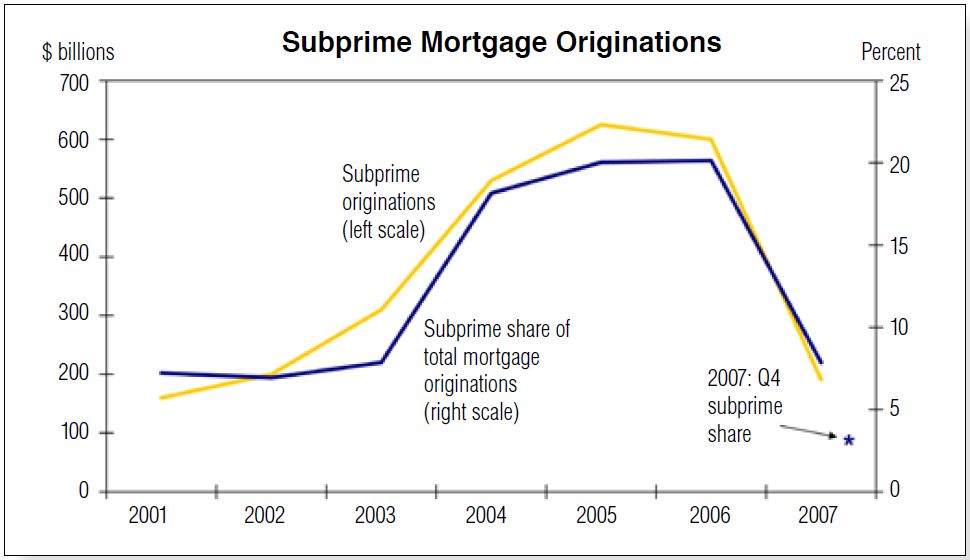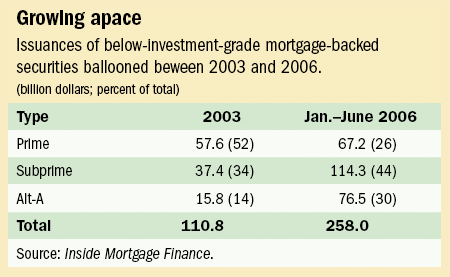Dad2three
Gold Member
Q When did the Bush Mortgage Bubble start?
A The general timeframe is it started late 2004.
From Bushs Presidents Working Group on Financial Markets October 2008
The Presidents Working Groups March policy statement acknowledged that turmoil in financial markets clearly was triggered by a dramatic weakening of underwriting standards for U.S. subprime mortgages, beginning in late 2004 and extending into 2007.
Q Did the Community Reinvestment Act under Carter/Clinton caused it?
A "Since 1995 there has been essentially no change in the basic CRA rules or enforcement process that can be reasonably linked to the subprime lending activity. This fact weakens the link between the CRA and the current crisis since the crisis is rooted in poor performance of mortgage loans made between 2004 and 2007. "
http://www.federalreserve.gov/newsevents/speech/20081203_analysis.pdf
Q Why is it commonly called the subprime bubble ?
A Because the Bush Mortgage Bubble coincided with the explosive growth of Subprime mortgage and politics. Also the subprime MBS market was the first to collapse in late 2006. In 2003, 10 % of all mortgages were subprime. In 2006, 40 % were subprime. This is a 300 % increase in subprime lending. (and notice it coincides with the dates of the Bush Mortgage bubble that Bush and the Fed said)
Some 80 percent of outstanding U.S. mortgages are prime, while 14 percent are subprime and 6 percent fall into the near-prime category. These numbers, however, mask the explosive growth of nonprime mortgages. Subprime and near-prime loans shot up from 9 percent of newly originated securitized mortgages in 2001 to 40 percent in 2006
https://www.dallasfed.org/assets/documents/research/eclett/2007/el0711.pdf
Q. Er uh, didnt you notice your link said the explosive growth of subprime mortgages started in 2001?
A. It did kinda say that didnt it? However, the link below clearly states subprime was 10 % in 2003. 9% in 2001 to 10% in 2003 is only a 1% increase. A 1 % increase over 3 years is flat not explosive. 10 % in 2003 to 40% in 2006 is explosive. So the explosive growth started in 2004 which lines up pretty good but not exactly with the timeframe of the Bush Mortgage Bubble.
In dollar terms, nonprime mortgages represented 32 percent of all mortgage originations in 2005, more than triple their 10 percent share only two years earlier
FRB: Finance and Economics Discussion Series: Screen Reader Version - 200899
A The general timeframe is it started late 2004.
From Bushs Presidents Working Group on Financial Markets October 2008
The Presidents Working Groups March policy statement acknowledged that turmoil in financial markets clearly was triggered by a dramatic weakening of underwriting standards for U.S. subprime mortgages, beginning in late 2004 and extending into 2007.
Q Did the Community Reinvestment Act under Carter/Clinton caused it?
A "Since 1995 there has been essentially no change in the basic CRA rules or enforcement process that can be reasonably linked to the subprime lending activity. This fact weakens the link between the CRA and the current crisis since the crisis is rooted in poor performance of mortgage loans made between 2004 and 2007. "
http://www.federalreserve.gov/newsevents/speech/20081203_analysis.pdf
Q Why is it commonly called the subprime bubble ?
A Because the Bush Mortgage Bubble coincided with the explosive growth of Subprime mortgage and politics. Also the subprime MBS market was the first to collapse in late 2006. In 2003, 10 % of all mortgages were subprime. In 2006, 40 % were subprime. This is a 300 % increase in subprime lending. (and notice it coincides with the dates of the Bush Mortgage bubble that Bush and the Fed said)
Some 80 percent of outstanding U.S. mortgages are prime, while 14 percent are subprime and 6 percent fall into the near-prime category. These numbers, however, mask the explosive growth of nonprime mortgages. Subprime and near-prime loans shot up from 9 percent of newly originated securitized mortgages in 2001 to 40 percent in 2006
https://www.dallasfed.org/assets/documents/research/eclett/2007/el0711.pdf
Q. Er uh, didnt you notice your link said the explosive growth of subprime mortgages started in 2001?
A. It did kinda say that didnt it? However, the link below clearly states subprime was 10 % in 2003. 9% in 2001 to 10% in 2003 is only a 1% increase. A 1 % increase over 3 years is flat not explosive. 10 % in 2003 to 40% in 2006 is explosive. So the explosive growth started in 2004 which lines up pretty good but not exactly with the timeframe of the Bush Mortgage Bubble.
In dollar terms, nonprime mortgages represented 32 percent of all mortgage originations in 2005, more than triple their 10 percent share only two years earlier
FRB: Finance and Economics Discussion Series: Screen Reader Version - 200899







